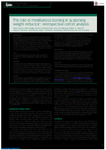The role of mindfulness training in sustaining weight reduction: retrospective cohort analysis

Date
2022-11Author
Subject
Metadata
Show full item recordAbstract
<jats:sec id="S2056472422006020_sec_a1"> <jats:title>Background</jats:title> <jats:p>Psychological stress has an established bi-directional relationship with obesity. Mindfulness techniques reduce stress and improve eating behaviours, but their long-term impact remains untested. CALMPOD (Compassionate Approach to Living Mindfully for Prevention of Disease) is a psychoeducational mindfulness-based course evidenced to improve eating patterns across a 6-month period, possibly by reducing stress. However, no long-term evaluation of impact exists.</jats:p> </jats:sec> <jats:sec id="S2056472422006020_sec_a2"> <jats:title>Aims</jats:title> <jats:p>This study retrospectively evaluates 2-year outcomes of CALMPOD on patient engagement, weight and metabolic markers.</jats:p> </jats:sec> <jats:sec id="S2056472422006020_sec_a3" sec-type="methods"> <jats:title>Method</jats:title> <jats:p>All adults with a body mass index >35 kg/m<jats:sup>2</jats:sup> attending an UK obesity service during 2016–2020 were offered CALMPOD. Those who refused CALMPOD were offered standard lifestyle advice. Routine clinic data over 2 years, including age, gender, 6-monthly appointment attendance, weight, haemoglobin A1C and total cholesterol, were pooled and analysed to evaluate CALMPOD.</jats:p> </jats:sec> <jats:sec id="S2056472422006020_sec_a4" sec-type="results"> <jats:title>Results</jats:title> <jats:p>Of 289 patients, 163 participated in the CALMPOD course and 126 did not. No baseline demographic differences existed between the participating and non-participating groups. The CALMPOD group had improved attendance across all 6-monthly appointments compared with the non-CALMPOD group (<jats:italic>P</jats:italic> < 0.05). Mean body weight reduction at 2 years was 5.6 kg (s.d. 11.2, <jats:italic>P</jats:italic> < 0.001) for the CALMPOD group compared with 3.9 kg (s.d. 10.5, <jats:italic>P</jats:italic> < 0.001) for the non-CALMPOD group. No differences in haemoglobin A1C and fasting serum total cholesterol were identified between the groups.</jats:p> </jats:sec> <jats:sec id="S2056472422006020_sec_a5" sec-type="conclusions"> <jats:title>Conclusions</jats:title> <jats:p>The retrospective evaluation of CALMPOD suggests potential for mindfulness and compassion-based group educational techniques to improve longer-term patient and clinical outcomes. Prospective large-scale studies are needed to evaluate the impact of stress on obesity and the true impact of CALMPOD.</jats:p> </jats:sec>
Collections
Publisher
Place of Publication
Journal
Volume
Issue
Pagination
Number
Recommended, similar items
The following license files are associated with this item:

